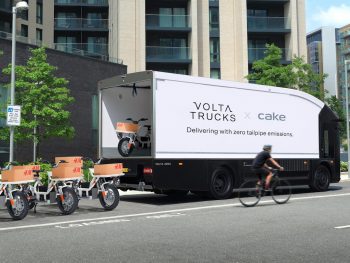Volta Trucks is working with Cake electric motorcycles to help decarbonise and streamline last-mile deliveries.

The two Swedish electric innovators will use a combination of electric trucks and electric two-wheelers to provide a fully integrated, zero tailpipe emission delivery service, running from warehouse to end customer.
The first trial, planned for Q1 2023 in Paris, will be with fashion brand H&M Group and will use the Volta Zero electric truck as a mobile micro hub, or mini warehouse. Cake’s electric motorcycles will be loaded into the Volta Zero from the distribution centre at the start of the working day and deployed into the city centre.
From there, the motorcycles will deliver the last mile of parcels to customers in the fastest and most sustainable way, while also helping to reduce congestion.
The Volta Zero can be redeployed to other locations throughout the day or used to provide quick-replacement batteries for the Cake motorcycles if necessary, providing an efficient city-wide coverage for deliveries.
The firms said the integration of the two technologies offers immediate opportunities for retailers serving the rapidly growing e-commerce delivery industry.
Essa Al-Saleh, CEO of Volta Trucks, explained: “We’ve designed the full-electric Volta Zero to be the cleanest, safest and most efficient urban delivery vehicle. Most of our customers are using trucks to deliver from out-of-town warehouses to inner city stores. But as a forward-thinking brand, we’ve always sought innovative partners to deliver new and industry-redefining solutions. The partnership between Volta Trucks and Cake will showcase how a combination of zero tailpipe emission transport solutions can bring benefit to brands and customers, such as the H&M Group, and city centre environments.”
Stefan Ytterborn, founder and CEO of Cake, added: “As the majority of today’s last-mile delivery chains will soon be banned in many of the world’s largest cities, world-leading e-commerce consumer brands need to engage in future-proof concepts now. Solutions need to be developed to offer lower emissions and less congestion, while benefiting from far more efficient deliveries all the way to the end custome

